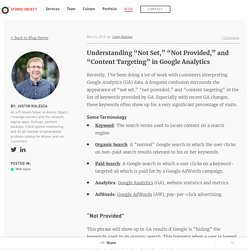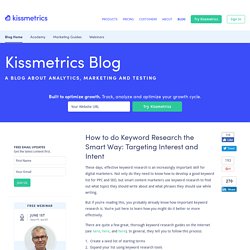

How to Remove Duplicates in Google Sheets. Google Sheets - Highlight Duplicate Data in a Column or Row. The Best Keyword Research Tool for Long Tail Keywordss - LongTailPro. The SEO platform of choice for Professional Marketers. Free Keyword Tool: Fast Keyword Suggestion Service to Research Related PPC & SEO Keywords.
New: Generate keywords using our keyword list generator.

Clean up your keyword lists using our keyword list cleaner. Column by Column Feature Description Export to CSV - clicking this button allows users to export the keyword list & metrics to an Excel spreadsheet, along with lists of the same keywords using the various PPC ad matching type formats Keyword - the word that was searched for, or other related terms returned by the tool. Clicking on a word in this column will perform a new keyword search using that term as the seed keyword. Monthly Searches - estimated number of monthly web searches for the term in the United States across Google, Bing & Yahoo!
An easy way to see if Google thinks your webpages are keyword relevant. BuzzSumo. The 80/20 Guide to Keyword Research Without Opening a Single Spreadsheet. There is no doubt about the importance of keyword research even in today’s search engine landscape.

Targeting keywords can have a big impact on your search engine optimization and organic traffic. But it’s also time-consuming, painful, and often futile. SEO Rank Tracker & Reporting - AgencyAnalytics. The Ultimate Semantic SEO Guide for 2017 & Beyond. BloomBerry. AnswerThePublic.com: that free visual keyword research & content ideas tool. KWFinder - Keyword research and analysis tool.
Discover The Most Profitable Keywords For PPC & SEO. How to Perform Mobile Keyword Research. Here’s a topic I bet you haven’t thought much about: mobile keywords.

If you haven’t been focusing on this, don’t beat yourself up over it. It’s only in the last few years that SEOs and marketers have even thought about mobile keywords as different from desktop keywords. But mobile and desktop keywords should definitely be treated as two separate things. We’re moving more and more toward a mobile-first world. According to Smart Insights, mobile devices account for 51% of all digital media time. Advanced SEO Strategy That Gets Results. Free Keyword Rank Checker - Google & Yahoo. "Not Set," "Not Provided," & "Content Targeting" in Analytics. Recently, I’ve been doing a lot of work with customers interpreting Google Analytics (GA) data.

A frequent confusion surrounds the appearance of “not set,” “not provided,” and “content targeting” in the list of keywords provided by GA. Especially with recent GA changes, these keywords often show up for a very significant percentage of visits. Some Terminology. A Nutshell Guide to Proper Keyword Research. Using Related Topics and Semantically Connected Keywords in Your SEO. [Estimated read time: 8 minutes] Back in February, we explored balancing keyword targeting with concept targeting.

Using Related Topics and Semantically Connected Keywords in Your SEO. Four More Ways to Crack the Keyword (not provided) Code. Secure search now obscures up to 60% of search visits, making it virtually impossible to determine which keywords are driving your site traffic.

Appearances of the dreaded (not provided) have been steadily increasing. Now the default Google Analytics reporting is nearly worthless for understanding the impact and opportunities for your SEO program. This has been driven primarily by the inclusion of secure search in Google Chrome and Firefox browsers for all logged-in Google account holders. If one of your website visitors comes from search while logged into Gmail, that referring keyword is hidden from your view. The same goes for a user logged into Google+, YouTube, Google Drive… You get the picture. And while the percentage of hidden keywords varies from industry to industry, it has reached a point where large chunks of search traffic are distilled down into nothing more than a single line item in Google Analytics – an enigma wrapped in a riddle, as it were.
(image via Search Engine Land) Trends. #1 Keyword Tool Reveals 1000's Of Words Planner Doesn't. How to Do Keyword Research for SEO: A Beginner's Guide. While Google keeps us on our toes with all the algorithm updates they keep rollin' out, one thing has stayed pretty consistent for inbound marketers looking to optimize their websites for search: keyword research.

Well, the need to do keyword research has stayed the same. How you actually do it hasn't. What is keyword research? Keyword research is when people use keywords to find and research actual search terms that people enter into search engines. The knowledge about these actual search terms can help inform content strategy, or marketing strategy overall. How To Do Keyword Research - The Beginners Guide to SEO. Chapter 3 Understand what your audience wants to find.

#1 Keyword Tool Reveals 1000's Of Words Planner Doesn't. Bing Ads Intelligence tool - Bing Ads Training - Bing Ads. Bing Ads Intelligence is a powerful keyword research and optimization tool that operates seamlessly in Microsoft Office Excel.

Once installed, open Excel and you’ll see a tab on the menu bar called Bing Ads Intelligence. Click the tab to start building your keyword lists and gauging keyword performance on the Bing Network. Being able to view, select and bid on the best performing keywords makes this tool critical for maximizing your ad spend. Keyword Explorer: One Tool for All Your Keyword Research. How to do Keyword Research the Smart Way: Targeting Interest and Intent. These days, effective keyword research is an increasingly important skill for digital marketers.

Not only do they need to know how to develop a good keyword list for PPC and SEO, but smart content marketers use keyword research to find out what topics they should write about and what phrases they should use while writing. But if you’re reading this, you probably already know how important keyword research is.
You’re just here to learn how you might do it better or more effectively. There are quite a few great, thorough keyword research guides on the internet (see here, here, and here). Using Semantics to Optimize Your SEO in 2016. There were a number of significant changes to the SEO landscape during 2015, changes that directly inform the new ways of setting up digital marketing strategies for success in 2016. One of the biggest changes was Google’s RankBrain announcement. There were many speculations around this announcement of an artificial intelligence program, but as research shows it primarily focused on non-understandable queries and those using colloquialisms.
Now it has become part of the overall algorithm because Google is looking to better understand the intent behind a search. So the question is: how do you build a digital marketing strategy in 2016 that is focused on intent? 12 Things You Need to Do for Semantic Search. Semantic search. You’ve heard of it, you’ve researched it and you’re probably wondering what to do about it.
Black hat, white hat, and everything in between could soon be a thing of the past, as semantic search forces the industry to revert back to the question: What does the user want? It’s a simple concept, but one that has been lost in a whirlwind of advice, speculation, and see-what-sticks techniques. Semantic search gives the industry a chance to go back to basics and provide information rather than force it. LSIGraph: LSI Keyword Generator. Free Rank Checker: Google + Microsoft Bing Online Rank Tracker. Please bookmark this page on Delicious for your future reference. Set up your free SEO Book account, and you will get this tool + 2 other SEO tools valued at over $300 for free. Already have an account? Log in and your installation link will appear in the place of this message. Rankchecker.net SEO Tool. SEO: Why Your Long Tail Isn’t Long. SEO: How to Maximize the Long Tail. Ecommerce sites are naturally suited to target the long tail of organic search performance.
How you optimize your site determines how long its tail could be. The long tail of marketing also applies to SEO. Image: Longtail.com. The long tail of search refers to author Chris Anderson’s concept found in his book, The Long Tail: Why the Future of Business Is Selling Less of More. The premise is that the value driven by the overwhelming number of niche items will overshadow the value of the individually larger but much smaller-in-aggregate head items. The long tail, for SEO, applies to the number of searches a type of keyword is likely to drive. However, the greater value can be found in the long tail of search. In addition to the existing long tail phrases (which we can identify in keyword data or our own analytics), Google claims that 15 percent of the search queries it receives each day have never been searched.
Doing Competitor Analysis Before Entering A Niche! The following video is a snippet taken out from our Long Tail University Course. In it we share the importance of competitor analysis and how you can use it to influence your decisions. If you have a hard time figuring out whether a niche is too competitive for you or not, this post should help you to have a better idea before you start investing your time and money! Cost Effective SEO: How I Drove 34,000 Search Engine Visits in 60 Days (For Free)
Does Organic CTR Impact SEO Rankings? [New Data] [Estimated read time: 13 minutes] Does organic click-through rate (CTR) data impact page rankings? This has been a huge topic of debate for years within the search industry. Some people think the influence of CTR on rankings is nothing more than a persistent myth. Like the one where humans and dinosaurs lived together at the same time — you know, like in that reality series "The Flintstones"? Some other people are convinced that Google must look at end user data.
Google (OK, at least one Google engineer who spoke at SMX) seems to indicate the latter is indeed the case: I also highly encourage you to check out Rand Fishkin's Whiteboard Friday discussing clicks and click-through rate. Seems kind of obvious, right? Do not rely on just allintitle data for checking keyword competition – SeoStack. Official Google Webmaster Central Blog: Google does not use the keywords meta tag in web ranking. Recently we received some questions about how Google uses (or more accurately, doesn't use) the "keywords" meta tag in ranking web search results. Suppose you have two website owners, Alice and Bob. Alice runs a company called AliceCo and Bob runs BobCo. One day while looking at Bob's site, Alice notices that Bob has copied some of the words that she uses in her "keywords" meta tag.
Even more interesting, Bob has added the words "AliceCo" to his "keywords" meta tag. How To Quickly & Easily Track Your Website's Rankings. Knowing exactly where your website ranks in the SERPs is vital for its growth. For example, if you knew that a certain post is currently sitting at that accursed 11th position in Google, you’d know that you have to give it just a little extra push to get it over the hump. Being aware of exactly where each of your website’s articles is ranking is a huge advantage because it gives you the means of focus – the means to know exactly where to push when you are so close to those top positions.
In the end, tracking the rankings of your website will result in a phenomenal increase in organic traffic. Magento and SEO: URL and Keywords - Merchant ProtocolMerchant Protocol. SEO Reporting with Google Tag Manager. By Alex Moore / December 30, 2013.